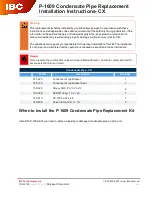
13
7.0
WATER QUALITY
The Lochinvar Herald contains a stainless steel heat exchanger; therefore, care must be exercised to ensure that the
system water and any water treatment are compatible. Whenever a new boiler is connected to an existing system, the
pipework must be thoroughly cleaned and flushed to remove debris, rust particles, carbonate deposits and any existing
water treatment that might be incompatible with the heat exchanger. If the existing system is in poor condition and/or
cannot be pressurised, then consideration should be given to using a Plate system separator. See Section 13.3.2 for
details, new systems must also be thoroughly flushed to remove debris and flux deposits.
Failure of the heat exchanger due to deposits in the water are not covered under the boiler
warranty. For advice on system treatment or separation contact Lochinvar technical support.
Whilst chemical inhibitors remove oxygen from the water, due to uncertainty in dosing levels, there is the possibility that
the inhibitor will eventually be diluted to the point where it is no longer effective. To ensure there is effective air
separation and removal, an air separator should be fitted to the hottest part of the system, in accordance with the item
manufacturer’s instructions. In addition to this a means of dirt removal (e.g. dirt separator or strainer) should be fitted
to the boiler return pipework to prevent the accumulation of debris within the heat exchanger coils.
The use of chemical inhibitors alone will not satisfy the terms of the heat exchanger warranty.
8.0
LOCATION
8.1
PLANT ROOM REQUIREMENTS
The Lochinvar Herald may only be installed in a room that complies with the appropriate ventilation requirements.
The Lochinvar Herald can be used as a type C
13
, C
33
, C
43
or C
53
(room sealed) appliance. Due to its room sealed
design, ventilation allowances for combustion air are not necessary, provided the minimum clearances and service
clearances as detailed in
PLANT-ROOM INSTALLATION CLEARANCES (mm) are observed. If the appliance is to be installed in a
compartment or a hot environment, the minimum clearances detailed in
ENCLOSURE INSTALLATION CLEARANCES (mm) should be observed. In addition to this, ventilation for cooling
purposes must be fitted. For further guidance, please refer to Section on AIR SUPPLY or to BS5440-2 or BS6644 as
appropriate.
The Lochinvar Herald can also be used as a type B
23
(open flue) appliance. If such a configuration is to be used, then
appropriate ventilation for cooling and combustion must be provided. For further details, please refer to Section on
AIR SUPPLY or to BS5440-2 or BS6644 as appropriate.
8.2
GENERAL REQUIREMENTS
Corrosion of the heat exchanger coils and flue system may occur if air for combustion contains certain chemical vapours.
Such corrosion may result in poor combustion and create a risk of asphyxiation. Aerosol propellants, cleaning solvents,
refrigerator and air conditioning refrigerants, swimming pool chemicals, calcium and sodium chloride, waxes and
process chemicals are corrosive. Products of this sort should not be stored near the boiler or outside by the air intake
(if applicable). The fitting of this equipment in a situation where aerosols or other chemicals may be entrained into the
combustion air will invalidate the warranty.
The equipment must be installed on a level surface that is capable of adequately supporting its weight (when filled with
water) and any ancillary equipment. The operation of the equipment must not cause the temperature of any combustible
material in the vicinity of the equipment and its flue to exceed 65°C. If such a situation is unavoidable, appropriate
insulation should be provided.
Locate the equipment so that if the appliance or any connecting pipework should leak, water
damage will not occur. When such locations cannot be avoided it is recommended that a
suitable drain pan be installed under the equipment. The pan should be adequately drained but
must not restrict the combustion or ventilation airflow.
Summary of Contents for HERALD HCB116CE
Page 8: ...8 3 1 2 PRINCIPLE PARTS TO BE USED IN CONJUNCTION WITH TABLE 3 1 1...
Page 31: ...31 Max distance between brackets...
Page 32: ...32...
Page 33: ...33...
Page 37: ...37...
Page 53: ...53 15 8 WIRING DIAGRAM 15 8 1 WIRING DIAGRAM...
Page 54: ...54 15 9 LADDER DIAGRAM 15 9 1 LADDER DIAGRAM...
Page 92: ...92...














































